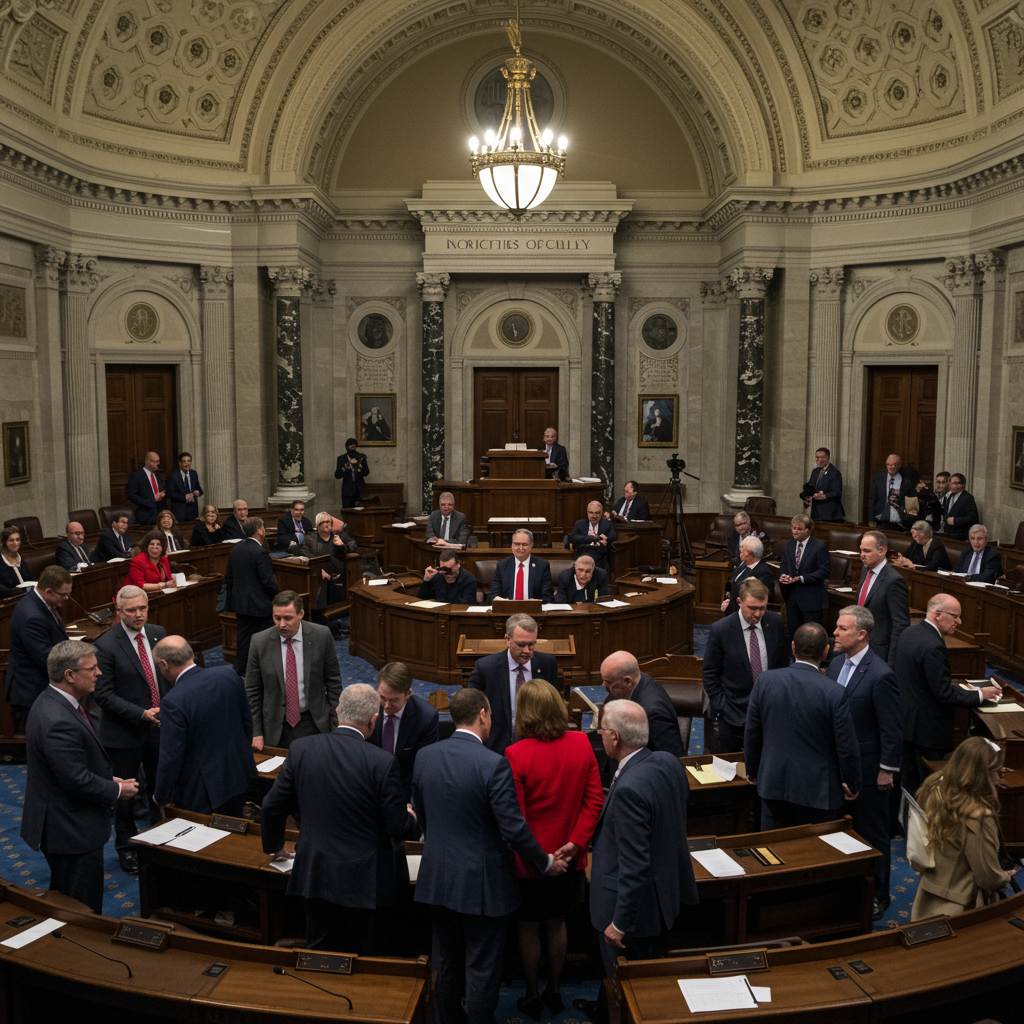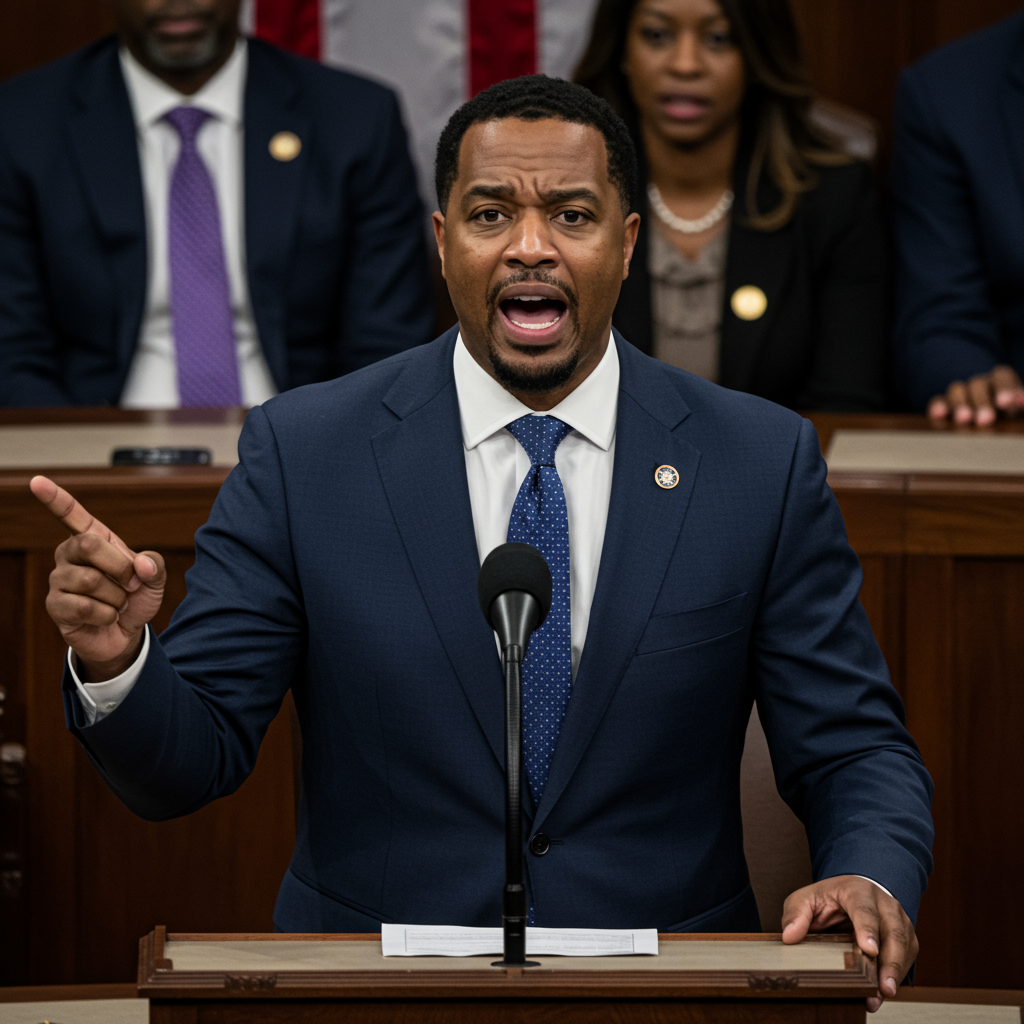The United States Congress is currently locked in a high-stakes legislative battle, with a critical Senate vote looming that could determine the fate of the nation’s longest government shutdown. This unprecedented impasse, stretching over a month, has plunged federal services into disarray and ignited fierce debate, particularly among Senate Democrats who are grappling with how to end the crisis while securing their policy aims, notably the extension of expiring Affordable Care Act (ACA) subsidies. The proposed package, intended to reopen the government, presents a significant test of unity for the Democratic caucus, as leaders from both sides of the aisle engage in a blame game amidst mounting public pressure.
Historic Stalemate: The Longest Government Shutdown Unpacked
The current government shutdown has made history, surpassing previous records in duration and impact. Now in its 30s-something day, the prolonged funding lapse has created widespread disruptions across the nation. From depleted SNAP (food stamp) benefits affecting millions of low-income families to significant flight delays and cancellations mandated by the Federal Aviation Administration (FAA) due to air traffic controller shortages, the real-world consequences are increasingly dire. Federal employees, many working without pay, face immense financial strain, while essential programs like Head Start and heating assistance for vulnerable populations hang in the balance.
The core of this legislative stalemate revolves around two distinct priorities. Republicans, led by Senate Majority Leader John Thune, are pushing a package designed to fund specific government sectors such as food aid and veterans’ programs, while extending funding for other areas. Their key condition: reopening the government before negotiating on the expiring ACA subsidies. Democrats, however, have consistently rejected proposals that do not guarantee a pathway to address these critical healthcare costs.
The Looming Senate Showdown
A procedural vote is anticipated in the Senate, potentially as early as this week, on a revamped package to temporarily fund the government. This proposal would initially advance an existing framework, later adding three appropriations bills. Crucially, it comes with a guarantee of a future Senate vote on a policy to extend Affordable Care Act subsidies, which are set to expire at year-end, threatening to significantly boost health care premiums for millions of Americans.
This proposed deal puts Senate Democrats in a challenging position. After weeks of internal debate and a united front against previous Republican offers – having voted 14 times against reopening the government without an ACA fix – they now face a choice: hold firm for an immediate guarantee on subsidies or accept a promise of a future vote in exchange for ending the shutdown.
Republicans’ Strategy: Funding First, Healthcare Later
Senate Majority Leader John Thune has been at the forefront of the Republican effort, emphasizing a “reopen government first” approach. He has stated that Republicans have offered Democrats “everything they wanted or had asked for” in negotiations, urging them to “take yes for an answer.” Thune’s proposed package aims to fund critical areas like food aid, veterans’ programs, and the legislative branch, extending other government funding until December or January. This strategy is partly driven by a desire to avoid a pre-Christmas omnibus spending bill.
However, a major hurdle to any bipartisan agreement comes from House Speaker Mike Johnson, who has explicitly refused to promise any commitment on a future House vote for a health care bill as part of a shutdown deal. His firm stance, “I’m not promising anybody anything,” complicates efforts to build broad support, as Democrats insist on buy-in from both the White House and the House for a lasting resolution. President Donald Trump has also consistently pushed for the elimination of the Senate filibuster, referring to it as the “nuclear option,” believing it would end the shutdown swiftly. Yet, Senate Majority Leader Thune has repeatedly rejected this, citing insufficient votes among Republicans to change the rule.
Democrats Divided: Holding Out vs. Compromising
The Democratic caucus is navigating significant internal divisions. Many, bolstered by recent election victories that they interpret as a mandate to fight for health care tax credits, advocate for continuing the standoff until Republicans and President Trump agree to extend the ACA subsidies immediately. Senators like Bernie Sanders (I-VT) have urged “every Democrat stands firm” against any agreement until health care premiums are addressed.
Conversely, an influential group of moderate Democrats, including Senator Jeanne Shaheen of New Hampshire and Senator Gary Peters of Michigan, has engaged in closed-door negotiations, exploring a deal that would reopen the government with an agreement for a future vote on health care. This aligns with elements of the bipartisan package put forward by Senator Thune. The challenge lies in what commitments Thune, and more critically, Speaker Johnson and President Trump, would make on health care to secure enough Democratic votes. Senate Democratic leader Chuck Schumer (D-NY) has yet to weigh in on the specifics of this latest legislative push, but has acknowledged that President Trump “is clearly feeling pressure to bring this shutdown to an end.”
The Affordable Care Act at the Center
The expiration of Affordable Care Act subsidies is not merely a political talking point; it carries significant financial implications for millions of Americans. Without these subsidies, health insurance premiums are projected to rise sharply at the end of the year, making healthcare less affordable for many. Democrats argue that this issue directly impacts household budgets and the overall well-being of their constituents, making it a non-negotiable component of any shutdown resolution. The Republican refusal to address this issue upfront or guarantee a future vote with clear intent is what fuels Democratic skepticism and distrust, as echoed by widespread public comments.
The Human Cost: Beyond the Political Rhetoric
While Washington D.C. grapples with political maneuvering, the consequences of this prolonged shutdown ripple across the country. Transportation Secretary Sean Duffy has sharply criticized senators for leaving Washington while the crisis persists, urging airline travelers experiencing delays to contact their “Democrat senator,” claiming they had voted “14 times…to keep the government shut down.” Meanwhile, negotiations are reportedly underway to include language in a final agreement to reverse some mass firings of government workers and ensure back pay for furloughed employees, a critical demand voiced by moderate Republicans like Senator Susan Collins (R-ME) and Democrats alike, with Senator Mark Warner (D-VA) sponsoring legislation to rehire affected workers. This focus on the welfare of federal employees underscores the growing urgency and the tangible impact of the political deadlock.
Expert Analysis: A Test of Democratic Resolve and Public Trust
This impending Senate vote represents more than just a procedural step; it’s a critical test of Democratic resolve and the sustainability of their unified front. The internal divisions within the Democratic party are a natural consequence of the mounting pressure from both union allies demanding an end to the shutdown and progressive groups urging continued steadfastness. The challenge lies in balancing the immediate need to restore government functions with the long-term goal of protecting affordable healthcare.
Furthermore, the ongoing blame game and the refusal of key leaders to negotiate directly only erode public trust in government’s ability to function. The precedent set by this shutdown, where essential public services are used as leverage for partisan policy demands, could have lasting implications for future governance and political discourse. For citizens, understanding the nuances of these negotiations, from the specifics of funding bills to the complexities of ACA subsidies, is crucial for holding their representatives accountable.
—
Frequently Asked Questions
What is the core disagreement causing the current government shutdown?
The central conflict stems from Republicans’ insistence on reopening the government with a package that funds specific sectors and extends general funding without an immediate fix for expiring Affordable Care Act (ACA) subsidies. Democrats, conversely, are demanding that any deal to end the shutdown must either include an extension of these subsidies, which prevent health insurance premiums from rising, or at least guarantee a firm, binding commitment for a future vote on the issue. This dispute over healthcare costs, combined with a broader fight over federal spending priorities, has created the prolonged legislative stalemate.
How are federal services and citizens being impacted by this prolonged shutdown?
The extended government shutdown has severe consequences for both federal services and millions of American citizens. Key impacts include significant flight delays and cancellations mandated by the FAA due to staff shortages, depletion of SNAP (food stamp) benefits, and the suspension or reduction of various federal programs. Thousands of federal workers are either furloughed or working without pay, leading to immense financial stress and potential economic ripple effects. Essential services like Head Start early education programs and heating assistance for low-income families are also at risk, highlighting the wide-ranging public disruption.
Why are Senate Democrats facing a critical vote on the government funding package?
Senate Democrats are at a critical juncture because the proposed funding package offers a promise of a future vote on ACA subsidies rather than an immediate fix or an ironclad guarantee. After weeks of rejecting Republican proposals and maintaining unity to push for an ACA solution, this new package forces them to decide whether to accept the promise of a future vote to end the shutdown, or continue holding out for more immediate assurances. This decision tests their internal unity, balancing the urgent need to restore government operations against their commitment to protecting affordable healthcare and avoiding a perceived concession to Republican demands without tangible policy gains.
—
Conclusion
The current government shutdown has evolved into a defining moment for American politics, challenging the efficacy of legislative compromise and highlighting the profound impact of partisan division. As Senate Democrats prepare for a pivotal vote, their decision will not only shape the immediate future of government operations but also cast a long shadow over the fate of Affordable Care Act subsidies and the rising cost of healthcare. The nation watches as lawmakers navigate this complex landscape, with millions of lives and critical services hanging in the balance, urging a resolution that prioritizes public welfare over political posturing.




